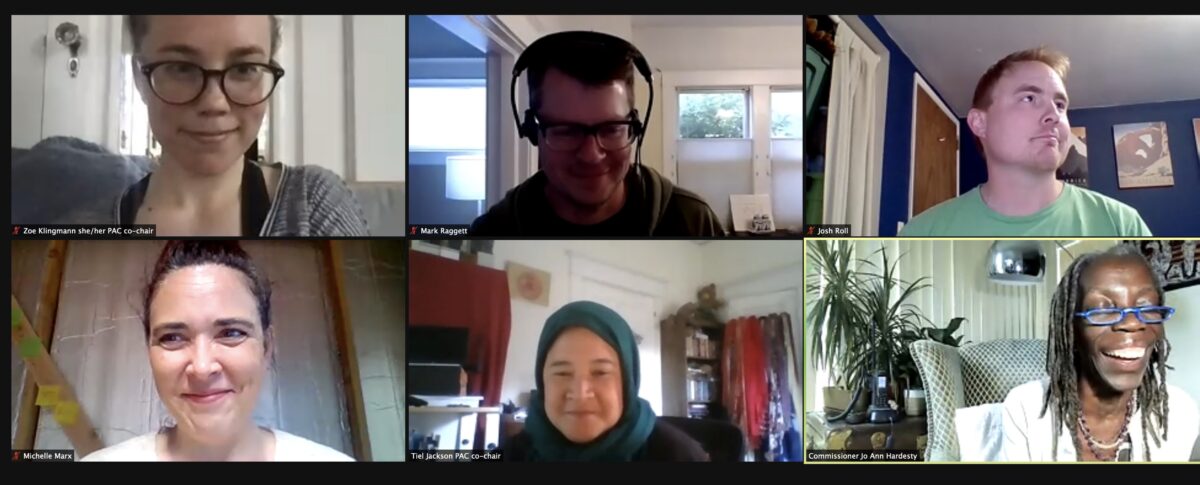
One week after her comments at the Portland Bicycle Advisory Committee created a stir of debate in advocacy circles, Transportation Commissioner Jo Ann Hardesty dropped into the Portland Pedestrian Advisory Committee (PAC). Like its cycling counterpart, the PAC is a group of volunteers who advise the Portland Bureau of Transportation on projects and policies.
At their meeting Tuesday night, the commissioner answered a range of questions from committee members and the public. Her answers revealed where Hardesty stands on key issues including the I-5 Rose Quarter project, the recent dissolution of the Portland Police Bureau Traffic Division, and more.
One committee member asked Hardesty, “What is your plan to reimagine traffic enforcement and how will you use the disbandment of the traffic enforcement unit as an opportunity to build something in its place?”
Advertisement
“We have to reimagine what community safety looks like,” Hardesty replied. “And safety looks different to different people.” She then claimed the PPB was playing politics with their narrative about traffic enforcement. “The disbanding of the traffic division was more a tactic, than a reality. Every police officer is a traffic cop. Every police officer has the ability to write tickets for for breaking traffic law… The reality is that police can and do [enforce traffic law]… So I disagree that we have less people with the ability to enforce traffic. The question is, why are they not doing it?”
“I disagree we have less people with the ability to enforce traffic. The question is, why are they not doing it?”
When asked about the potential of a new class of unarmed civil servants to replace traffic officers, Hardesty said she’s actively working on the issue. The current city budget includes funding for 26 additional Public Safety Support Specialists (PS3s), but Hardesty is skeptical about how they’re being used. “What they’re doing is administrative work. Why don’t we just hire administrative people to do the administrative work rather than pretending that we are creating a non-police presence, when in fact what we’re doing is creating police secretaries that have no interaction at all with the public.”
To further push on this issue, Hardesty was able to get an amendment into the budget that will assess the day-to-day responsibilities of PS3s. “I’m concerned about adding people into a system that really is dysfunctional at the moment.” She added that she has no problem with police in general. “I think we just need to make sure that police are focused on the work that they are required to do, like solve crime. And violating traffic law is a crime, and that’s what their job is so expect them to actually provide tickets and hold people accountable for traffic infractions, with or without a traffic division.”
Advertisement
Since taking over PBOT in late December, Hardesty has been a strong critic of ODOT’s work on the I-5 Rose Quarter project. In a February interview with BikePortland she said she was against widening the freeway and wants congestion pricing instead.
In the three months since, ODOT has failed to win her over.
Asked about the project at the PAC meeting, Hardesty said, “ODOT is not a good partner, they don’t play well with their community.” Despite being in communication with ODOT, Hardesty said she’s learned more about the project from media reports than from ODOT staff. She has also met with PBOT staff and leaders of Albina Vision, the nonprofit that’s working to rebuild the Rose Quarter as a residential and cultural hub for Black Portlanders.
“The honest answer is I just don’t know where I am yet. What I know is that it’s a problem that has to be fixed, and I’m trying to figure out a path to do that.”
— Hardesty on the I-5 Rose Quarter project
Hardesty has yet to meet with Portland Public Schools, whose board members have become increasingly distrustful of ODOT. “When I talked to ODOT, ODOT says, ‘Portland Public Schools is fine,'” Hardesty told the PAC. “Well PPS is not going to have kids breathing in the exhaust that’s going to come from that project. Any project that assumes that middle school kids will be inside all day and therefore the toxic nature of the project won’t matter, are fooling themselves.”
It’s clear Hardesty doesn’t trust ODOT (which puts her in an ever-growing majority of Portland-area elected officials and community leaders). She said she wants to “work my way back” and rejoin the I-5 Rose Quarter committee (that her predecessor Chloe Eudaly walked away from), but only if ODOT meets a set of “very specific demands” her office will share in a letter to the agency sometime in the next few weeks.
These demands, Hardesty said, “Will be the only vehicle to get me back to that table.” As for what those demands will be, Hardesty only said, “It’s really about making sure they are undoing the community harm that they did in the past, that they actually make sure that they are fixing the problem and not actually exacerbating the problem.”
When I asked Hardesty’s Policy Director Derek Bradley for an outline of the letter yesterday, he said, “Given the rapidly changing landscape of the conversation around the Rose Quarter, I’m not sure when the letter will be completed as we’re considering a number of factors that have recently changed.” I haven’t learned what those factors are.
Hardesty is clearly weighing her options around this controversial project very carefully. At the end of her response Tuesday she said, “I guess the honest answer is I just don’t know where I am yet. What I know is that it’s a problem that has to be fixed, and I’m trying to figure out a path to do that.”
— Jonathan Maus: (503) 706-8804, @jonathan_maus on Twitter and jonathan@bikeportland.org
— Get our headlines delivered to your inbox.
— Support this independent community media outlet with a one-time contribution or monthly subscription.


